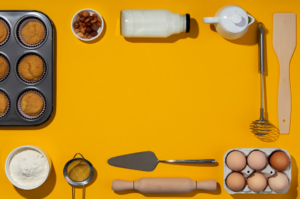Starting or upgrading a bakery is an exciting venture, but it comes with its own set of challenges. One of the most critical steps is choosing the right equipment. This decision can make or break your business, impacting everything from the quality of your products to your operational efficiency. Here, we’ll break down the importance of selecting the right bakery equipment, the different types available, and key factors to consider. By the end, you’ll have a clear understanding of how to outfit your bakery for success.
Essential Baking Tools for Home Bakers
When it comes to essential baking tools for home bakers, having the right equipment can elevate your baking experience and outcomes. Start with the basics: a good quality stand mixer or hand mixer can make mixing batters and doughs much more manageable. Invest in measuring cups and spoons, as accurate measurements are vital in achieving the desired results. Non-stick baking sheets and quality pans (like cake or muffin tins) are equally important, ensuring that your creations come out smoothly. Lastly, don’t overlook the importance of a reliable oven thermometer; it guarantees that your oven is at the correct temperature for perfect baking every time. With these tools, you’ll be well on your way to baking success in your own kitchen!
Industrial Equipment for Professional Bakeries
For professional bakeries, investing in industrial equipment is vital to ensure efficiency and consistency on a larger scale. Key pieces of equipment include commercial mixers, which are designed to handle larger batches of dough with ease, allowing for quicker production times. Ovens that can accommodate multiple racks are essential as well, providing the uniform heat needed for perfect baking results. Additionally, items like proofing cabinets and dough sheeters streamline processes and reduce the manual effort required. When selecting industrial equipment, it’s important to consider the volume of production, available space, and maintenance needs, ensuring that your bakery operates smoothly while delivering high-quality products. Remember, the right equipment not only enhances your baking capabilities but also reassures your customers of your commitment to quality.
Buying New vs. Used Equipment
When sourcing bakery equipment, you have the option to buy new or used. New equipment comes with warranties and the latest features, but it can be expensive. Used equipment is more affordable and can still be a good investment if it’s in good condition. Inspect used and refurbished bakery equipment thoroughly before purchasing, checking for signs of wear and tear. Buying from reputable dealers who offer warranties and return policies can provide peace of mind.
Quality and Durability
When choosing bakery equipment, quality and durability should be top priorities. High-quality tools and machines will last longer, perform better, and ultimately save you money in the long run. Stainless steel is a popular material choice due to its durability and ease of cleaning.
It’s also worth considering brands with a reputation for quality. While they may come with a higher price tag, the investment pays off with reliable performance and fewer repairs. Equipment that breaks down frequently can disrupt your workflow and cost you more in repairs and lost productivity.
Space and Layout
The layout of your bakery is another critical factor. Efficient use of space can improve workflow and increase productivity. Start by mapping out your kitchen, taking into account the dimensions of each piece of equipment and how they will fit together.
Consider equipment that serves multiple functions to save space. For example, a combination oven can handle baking, roasting, and steaming, reducing the need for multiple appliances. Rolling carts and shelving units can help maximize vertical space, keeping your kitchen organized and clutter-free.
Budget Considerations
Budget is always a concern, whether you’re a home baker or running a commercial operation. Prioritize essential equipment first, and gradually add more specialized tools as your budget allows.
Look for deals and discounts, but be cautious of equipment that’s too cheap. Sometimes, spending a bit more upfront can save you money in the long run by avoiding frequent replacements and repairs. Financing options are available for larger purchases, allowing you to spread the cost over time.
Energy Efficiency
Energy efficiency is not only good for the environment but also for your bottom line. Energy-efficient equipment can significantly reduce utility bills. Look for Energy Star-rated appliances, which meet strict energy efficiency guidelines set by the U.S. Environmental Protection Agency.
Consider induction cooktops, which are more energy-efficient than traditional gas or electric ranges. They heat up quickly and provide precise temperature control, making them ideal for baking. Additionally, LED lighting in refrigerators and freezers can save energy and reduce heat output.
The Importance of Warranties and After-Sales Support
Warranties and after-sales support are crucial when investing in bakery equipment. A good warranty can save you money on repairs and replacements, while after-sales support ensures you have help when you need it.
Look for suppliers who offer comprehensive warranties and have a reputation for excellent customer service. Reading reviews and asking for recommendations from other bakery owners can help you find reliable suppliers.

Choosing the right equipment for your bakery is a crucial step toward success. By considering factors like quality, layout, budget, and compliance, you can make informed decisions that enhance your operation. Whether you’re a home baker or run a professional bakery, investing in the right tools will pay off in the long run.
Take the time to evaluate your current equipment needs and explore your options. With the right equipment, you can elevate your baking game and ensure your business thrives. If you’re ready to take the next step, consider consulting with an expert to find the best solutions for your bakery. Happy baking!



